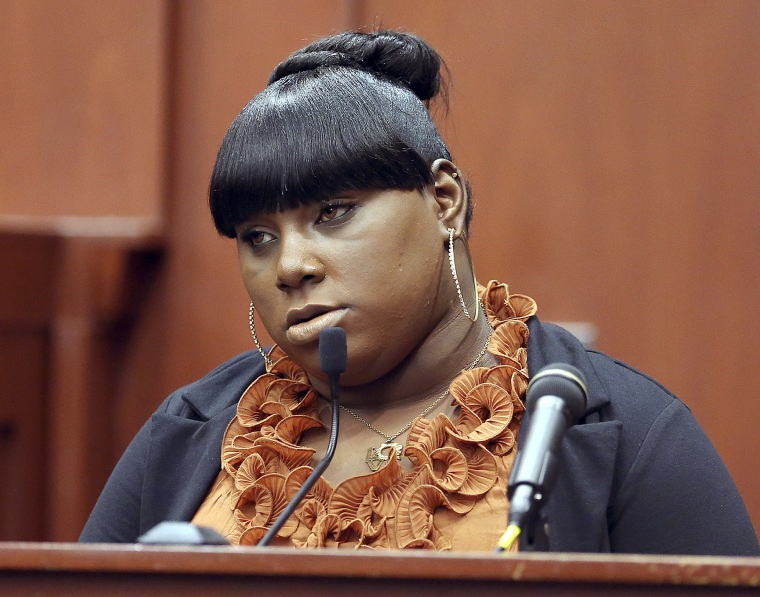Dramatic testimony from the last person to speak to Trayvon Martin brought attention to some of the intangible and uncomfortable undertones at the George Zimmerman trial.
Zimmerman has pleaded not guilty to second-degree murder in the 2012 shooting death of the Florida teen, claiming he shot Martin in self-defense.
Rachel Jeantel, a friend of Martin’s and one of the prosecution’s key witnesses, spent two days on the witness stand this week and more than five hours being cross-examined by Zimmerman’s defense team. But it’s mostly the style—not necessarily the substance—of her testimony that fueled the public conversation.
Some members of the media, the Twitterati and other online outlets criticized the 19-year-old for her arguably unpolished performance, citing everything from her personal appearance and facial expressions to her command of the English language. The criticisms focused, implicitly if not explicitly, on issues of race and class.
The exchanges between her and defense attorney Don West seemed tense at times. He picked apart some discrepancies between past depositions and her court testimony, such as why she didn’t attend the funeral. She blurted out, “That’s retarded, sir,” after the defense suggested Martin attacked Zimmerman. A few times, defense attorney Don West asked her to repeat herself, seeming to suggest it was hard to understand her way of speaking. The prosecution and judge also asked Jeantel to repeat herself.
When Jeantel first took the witness stand, prosecutor Bernie De La Rionda told her, "I know you grew up in Haitian family, so make sure that everybody can hear you, try to speak as clear..." The judge stepped in, asking, "Can you repeat what your answer was?"
Though Jeantel was asked to repeat herself on multiple occasions, according to Lehigh University Director of Africana Studies Dr. James Peterson, Jeantel’s style of speech was being “exploited” he says by the defense in particular, making it “difficult to stomach” for courtroom observers. “Jeantel is multilingual, comes to English as her second or third language, and speaks in a variety of English that is completely credible in her speech community,” said Peterson.
According to Jeantel, Martin allegedly told her that he was being chased by a “creepy-ass cracker”--a comment the defense team highlighted.
“Do people that you live around and with call white people, ‘creepy ass crackers’?" West asked.
"Not creepy. But cracker, yeah," Jeantel said.
“You’re saying that in the culture that you live in, in your community, people there call white people crackers?”
“Yes, sir,” she said.
Peterson suggested that line of questioning underscored racial subtleties of the case, which centers on Zimmerman, an adult of white and Hispanic descent, and Martin, an African-American teenager. “The defense is making an attempt to shift the onus of racism from Zimmerman to Ms. Jeantel and the speech community from which she and Trayvon Martin hale,” added Peterson. “That said, and considering all of the conventions and stereotypes stacked against her, Jeantel stood her ground.”
The Nation’s Mychal Denzel Smith came to her defense in a post titled, “Thank you, Rachel Jeantel.” He wrote, “Rachel Jeantel isn’t a Hollywood actress. She’s not a trained professional. She doesn’t testify in court regularly. She’s a young black woman missing her friend. She showed up to court to give all the information she had as to what happened the night he died….No matter what, though, Rachel stood and defended herself and Trayvon (and frankly, many other black youth) against the condescension, against silencing, and against the character attacks. For that, she should be commended and thanked.”
Washington Post columnist Jonathan Capehart contended West’s attempts to throw the witness off her game is simply a sign he’s “doing his job as a defense attorney.” But those tactics could backfire, he said. “Don West’s manner and the way he was going about his cross-examination of her was basically like a sculptor--chiseling–trying, at least--to chisel away at her credibility,” Capehart said. “But you know, I have to say if I were on the jury I think I would be a little put off by his demeanor” towards the teenager, unaccustomed to being under courtroom scrutiny.
To trial lawyer and NBC legal analyst Lisa Bloom, the cross-examination scene appeared normal, with “people having to concede some things on cross examination.”
“I’ll tell you--on social media, on my Twitter page, diametrically opposed opinions: some people feel very very strongly that she was a credible witness and that she was mistreated by the defense attorney on cross examination; others feel she has no credibility at all,” added Bloom. Ultimately, she said, “this is a young woman who stuck to her story, that Trayvon Martin was followed by George Zimmerman.”
What will matter in the end, of course, is how the jury hears the evidence.
Editor’s note: George Zimmerman has sued NBC Universal for defamation. The company strongly denies the allegation.
